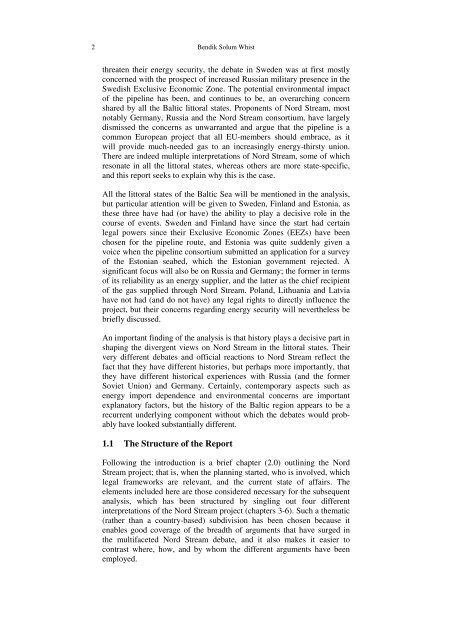Nord Stream: Not Just a Pipeline
Nord Stream: Not Just a Pipeline
Nord Stream: Not Just a Pipeline
Create successful ePaper yourself
Turn your PDF publications into a flip-book with our unique Google optimized e-Paper software.
2 Bendik Solum Whist<br />
threaten their energy security, the debate in Sweden was at first mostly<br />
concerned with the prospect of increased Russian military presence in the<br />
Swedish Exclusive Economic Zone. The potential environmental impact<br />
of the pipeline has been, and continues to be, an overarching concern<br />
shared by all the Baltic littoral states. Proponents of <strong>Nord</strong> <strong>Stream</strong>, most<br />
notably Germany, Russia and the <strong>Nord</strong> <strong>Stream</strong> consortium, have largely<br />
dismissed the concerns as unwarranted and argue that the pipeline is a<br />
common European project that all EU-members should embrace, as it<br />
will provide much-needed gas to an increasingly energy-thirsty union.<br />
There are indeed multiple interpretations of <strong>Nord</strong> <strong>Stream</strong>, some of which<br />
resonate in all the littoral states, whereas others are more state-specific,<br />
and this report seeks to explain why this is the case.<br />
All the littoral states of the Baltic Sea will be mentioned in the analysis,<br />
but particular attention will be given to Sweden, Finland and Estonia, as<br />
these three have had (or have) the ability to play a decisive role in the<br />
course of events. Sweden and Finland have since the start had certain<br />
legal powers since their Exclusive Economic Zones (EEZs) have been<br />
chosen for the pipeline route, and Estonia was quite suddenly given a<br />
voice when the pipeline consortium submitted an application for a survey<br />
of the Estonian seabed, which the Estonian government rejected. A<br />
significant focus will also be on Russia and Germany; the former in terms<br />
of its reliability as an energy supplier, and the latter as the chief recipient<br />
of the gas supplied through <strong>Nord</strong> <strong>Stream</strong>. Poland, Lithuania and Latvia<br />
have not had (and do not have) any legal rights to directly influence the<br />
project, but their concerns regarding energy security will nevertheless be<br />
briefly discussed.<br />
An important finding of the analysis is that history plays a decisive part in<br />
shaping the divergent views on <strong>Nord</strong> <strong>Stream</strong> in the littoral states. Their<br />
very different debates and official reactions to <strong>Nord</strong> <strong>Stream</strong> reflect the<br />
fact that they have different histories, but perhaps more importantly, that<br />
they have different historical experiences with Russia (and the former<br />
Soviet Union) and Germany. Certainly, contemporary aspects such as<br />
energy import dependence and environmental concerns are important<br />
explanatory factors, but the history of the Baltic region appears to be a<br />
recurrent underlying component without which the debates would probably<br />
have looked substantially different.<br />
1.1 The Structure of the Report<br />
Following the introduction is a brief chapter (2.0) outlining the <strong>Nord</strong><br />
<strong>Stream</strong> project; that is, when the planning started, who is involved, which<br />
legal frameworks are relevant, and the current state of affairs. The<br />
elements included here are those considered necessary for the subsequent<br />
analysis, which has been structured by singling out four different<br />
interpretations of the <strong>Nord</strong> <strong>Stream</strong> project (chapters 3-6). Such a thematic<br />
(rather than a country-based) subdivision has been chosen because it<br />
enables good coverage of the breadth of arguments that have surged in<br />
the multifaceted <strong>Nord</strong> <strong>Stream</strong> debate, and it also makes it easier to<br />
contrast where, how, and by whom the different arguments have been<br />
employed.













